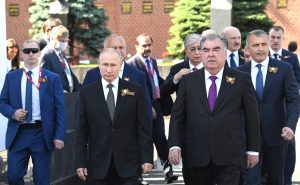Kyrgyz citizens tuning into livestream broadcasts of Russia’s (belated) Victory Day parade on June 24 expected to not just see Kyrgyz soldiers marching through Red Square but the face of President Sooronbay Jeenbekov in the stands near Russia’s Vladimir Putin, alongside other notable leaders.
But although cameras caught Jeenbekov’s visit to the Kremlin earlier in the day, as 24.kg pointed out he’s nowhere to be found in later shots of the gathered leaders walking alongside Putin. One video clip shows Tajik President Emomali Rahmon chatting Putin up at the front of the line, followed by the presidents of Belarus, Moldova, and Serbia. The presidents of Uzbekistan and Kazakhstan bring up the rear. Also in attendance were the de facto leaders of Georgia’s breakaway regions of South Ossetia and Abkhazia and the Bosnian Serb member of Bosnia’s multiethnic presidency, Milorad Dodik.
Russia’s annual Victory Day celebration, traditionally held on May 9, was delayed to June 24 by the coronavirus pandemic. It’s the first time since the 1995 resolution of annual military parades that it has been postponed. And the pandemic is why Jeenbekov skipped the parade despite traveling all the way to Moscow.
According to the Kyrgyz president’s office, two members of Jeenbekov’s delegation — a bodyguard and the head of the presidential office’s foreign policy unit — tested positive for COVID-19 upon arrival in Moscow. Jeenbekov tested negative but out of caution, decided to miss the festivities. Upon returning to Bishkek, the president is reportedly going to self-isolate for three days while the two who tested positive will be in two-week quarantine.
In Moscow, the parade went on as rescheduled. While most of 14,000 troops marching in the parade were Russian, forces from 13 other nations — Azerbaijan, Armenia, Belarus, China, India, Kazakhstan, Kyrgyzstan, Moldova, Mongolia, Serbia, Tajikistan, Turkmenistan, and Uzbekistan — took part as well.
While Russia envisioned a much larger event to mark the 75th anniversary of the end of World War II, known in the former Soviet Union as the Great Patriotic War, the pandemic delayed and altered the plan.
As of June 24, Russia has the third-highest number of confirmed COVID-19 cases in the world at 606,043 (the United States has the most at over 2.3 million and Brazil has rapidly shot into second with more than 1.1 million). Many of the world leaders who decided to stay away from the parade did so for the obvious reasons. Others did so for the obvious pandemic reason but generated more creative excuses.
Originally, the leaders of France, the Czech Republic, Croatia, and China had planned to attend the May 9 parade alongside leaders of the Soviet successor states.
Turkmenistan’s president, Gurbanguly Berdimuhamedov, was on an early June list of confirmed attendees according to the Kremlin, but in a June 19 telephone call with Putin, Berdimuhamedov announced that he wouldn’t be coming — on account of his 63rd birthday on June 29. Interestingly, a readout of the phone call doesn’t appear on the Kremlin’s website, but did in Turkmen state media, picked up from there in other regional media.
Croatian President Zoran Milanovic cancelled late, on June 22, with the country’s embassy in Moscow claiming his plane had broken down and he wouldn’t be able to attend. The presidents of Armenia and Azerbaijan, as Joshua Kucera explained in detail for Eurasianet, both declined at the last minute invitations to attend.
Had the pandemic not interfered, the originally planned parade and attendees would have underscored how far Russia and the West have split apart in recent years. A parade is just a parade, of course, but whom one invites to such an occasion and who actually shows up tells us something about the nature of the underlying relationships. Russia maintains the clearest and closest ties to the states of the former Soviet Union, pandemic or not.
In remarks after meeting with Uzbek President Shavkat Mirziyoyev on June 23, Putin outlined Uzbekistan’s contributions to the war: 2 million Uzbeks fought at the front, 500,000 died, 130,000 more went missing; Uzbekistan took in millions of people evacuated from other parts of the union and was the site of relocated Soviet industries.
“All this is our common history, our common achievements and our common Victory,” Putin said, repeating a common refrain. “At present, we are developing as independent states, but we enjoy absolutely unique strategic allied relations.”

































